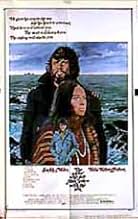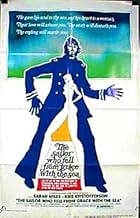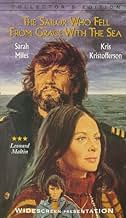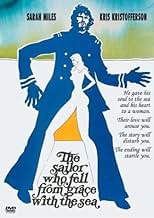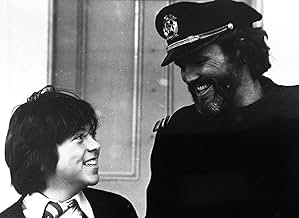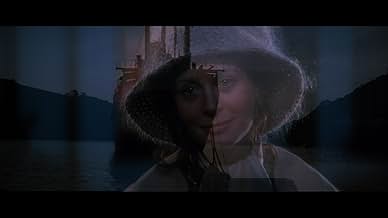Le marin qui abandonna la mer
Original title: The Sailor Who Fell from Grace with the Sea
IMDb RATING
6.2/10
1.8K
YOUR RATING
After his father dies, a disturbed young boy plots to take revenge on the new man in his mother's life.After his father dies, a disturbed young boy plots to take revenge on the new man in his mother's life.After his father dies, a disturbed young boy plots to take revenge on the new man in his mother's life.
- Director
- Writers
- Stars
- Awards
- 2 nominations total
Charles Adey-Grey
- Man in Tea Room
- (uncredited)
Mabel Etherington
- Woman in Tea Room
- (uncredited)
Juba Kennerley
- Man in Tea Room
- (uncredited)
- Director
- Writers
- All cast & crew
- Production, box office & more at IMDbPro
Featured reviews
This movie is morbid but is quite faithful to the original story. And it uses its Dover location very effectively in showing a place isolated in its own mythology.
The story is about a fatherless adolescent boy who is himself very much like the sea. He is restless and calm and seemingly untameable. All the confusion and frustrations of adolescence are portrayed here in an honesty that no other movie has ever dared to show. The restless urge to be a grown up and to move on to a life of daring excitement, and the desire to find a philosophy and a poetry to which one can ascribe are all explored in an uncompromising way in this film.
Desperate for an authority and leadership that he can look up to, the boy finds himself vying for the acceptance of a sadistic boy with a Nietzsche complex who uses a strain of hierarchy in his little band of friends in order to maintain control. Soon Kristofferson shows up and as he seems to be the stuff of oceanic legends, the boy finds a new hero to worship.
I would not even attempt to give the ending away. Suffice it to say that this is a most disturbing film in its subject matter and for those with short attention spans, it may seem slow in its pace. But like the sea, the film is languid in its pacing and it promises the same degree of poetry and savagery.
Fascinating viewing!
The story is about a fatherless adolescent boy who is himself very much like the sea. He is restless and calm and seemingly untameable. All the confusion and frustrations of adolescence are portrayed here in an honesty that no other movie has ever dared to show. The restless urge to be a grown up and to move on to a life of daring excitement, and the desire to find a philosophy and a poetry to which one can ascribe are all explored in an uncompromising way in this film.
Desperate for an authority and leadership that he can look up to, the boy finds himself vying for the acceptance of a sadistic boy with a Nietzsche complex who uses a strain of hierarchy in his little band of friends in order to maintain control. Soon Kristofferson shows up and as he seems to be the stuff of oceanic legends, the boy finds a new hero to worship.
I would not even attempt to give the ending away. Suffice it to say that this is a most disturbing film in its subject matter and for those with short attention spans, it may seem slow in its pace. But like the sea, the film is languid in its pacing and it promises the same degree of poetry and savagery.
Fascinating viewing!
This is a British drama from 1976 about a shy and lonely widow Anne (Sarah Miles) raising up her 13-year-old son in a small English seaside city. When she meets the American sailor Jim (Kris Kristofferson), she falls in love with him and wants to marry him. Her son, being a member of a fascist secret circle led by the charismatic pupil "Chief", doesn't agree with that liaison and uses his radical friends against his possible stepfather...
The German title of this brilliant movie was called "Der Weg allen Fleisches" which means as much as "The way of all flesh". This is a suitable title as love, loneliness, seduction, longings and sex are integral elements of the story.
The director uses surreal scenes to support the emotional side of the movie. There is a beautifully shot sex scenes between Anne and Jim, and an outstanding masturbation scene of Anne in front of a mirror, secretly watched by her son. There are strange dream sequences, spiritual moods of the sea and a cruel scene where the gang's leader rips off a dead cat to present his totalitarian theories to his worshippers by its testicles.
Sarah Miles ("Blow-up", "Venom"), Kris Kristofferson ("Pat Garrett and Billy the Kid", "Convoy") and also the children actors are doing a fine job here. The touching score was written by Johnny Mandel, and Kris Kristofferson added his chilling "Sea Dream Theme". This film is more than just a love drama but an outstanding and forgotten tale about love, sex and death at the seaside with great locations and a very strange ending. Watch it if you get the occasion to do so!
The German title of this brilliant movie was called "Der Weg allen Fleisches" which means as much as "The way of all flesh". This is a suitable title as love, loneliness, seduction, longings and sex are integral elements of the story.
The director uses surreal scenes to support the emotional side of the movie. There is a beautifully shot sex scenes between Anne and Jim, and an outstanding masturbation scene of Anne in front of a mirror, secretly watched by her son. There are strange dream sequences, spiritual moods of the sea and a cruel scene where the gang's leader rips off a dead cat to present his totalitarian theories to his worshippers by its testicles.
Sarah Miles ("Blow-up", "Venom"), Kris Kristofferson ("Pat Garrett and Billy the Kid", "Convoy") and also the children actors are doing a fine job here. The touching score was written by Johnny Mandel, and Kris Kristofferson added his chilling "Sea Dream Theme". This film is more than just a love drama but an outstanding and forgotten tale about love, sex and death at the seaside with great locations and a very strange ending. Watch it if you get the occasion to do so!
An unforgettable and profoundly disturbing story centered on a widow, Anne, and her only son, Jonathan, in a remote English seaside town. Jonathan belongs to a gang led by a precociously intelligent sociopath known only as Chief, who through sheer force of will and intellect, indoctrinates them with a quasi-Neitzchean philosophy of ultimate superiority and the non-existence of morality. When Kris Kristofferson's Captain Jim arrives in town, and strikes up a passionate relationship with the lonely Anne, Jonathan sees him as a heroic masculine prototype, removed from society and living a 'true' life on the open sea. But when the Captain decides to settle down and marry Anne, Jonathan takes it as an ultimate and unforgivable betrayal, and exacts a terrible revenge.
Based on the 1963 Mishima novel, "The Sailor Who Fell From Grace With The Sea" hints at many themes, from Jonathan's Oedipal obsession with spying on his mother's bedroom to his physical admiration of the Captain that verges on latent homosexuality. The atmosphere, masterfully created by veteran cinematographer Douglas Slocombe, is one of darkly brooding clouds, gray seas, and an air that constantly threatens rain. The (in)famous sex scenes are really not that explicit, and the casual violence exhibited by the children is far more shocking than any glimpse of breast or buttock.
The film, for all its brilliantly evocative atmosphere, excellent performances, and quietly brooding menace, is not without its flaws. The score is terrible, all mawkish piano and sickly clarinet. It is often overly intrusive and distracts from the overall sense of ripe stillness that director Carlino conjures throughout the film. But in general, the film is a remarkable experience, and one that any viewer is unlikely to forget quickly.
Based on the 1963 Mishima novel, "The Sailor Who Fell From Grace With The Sea" hints at many themes, from Jonathan's Oedipal obsession with spying on his mother's bedroom to his physical admiration of the Captain that verges on latent homosexuality. The atmosphere, masterfully created by veteran cinematographer Douglas Slocombe, is one of darkly brooding clouds, gray seas, and an air that constantly threatens rain. The (in)famous sex scenes are really not that explicit, and the casual violence exhibited by the children is far more shocking than any glimpse of breast or buttock.
The film, for all its brilliantly evocative atmosphere, excellent performances, and quietly brooding menace, is not without its flaws. The score is terrible, all mawkish piano and sickly clarinet. It is often overly intrusive and distracts from the overall sense of ripe stillness that director Carlino conjures throughout the film. But in general, the film is a remarkable experience, and one that any viewer is unlikely to forget quickly.
I really enjoyed this movie back when it came out in 1976. It never showed up at the major theaters though. I saw it in one of the Dollar theaters. How it got away with an R rating back then I will never know. I had seen x-rated movies that had showed less. And the love scenes were a spread in Playboy. My girlfriend said is was because it had a plot. I do remember she was in a state of shock when we left. She was an 18 year old Southern Bapist Sunday School teacher at the time. Kris Kristofferson was never highly rated as an Actor but I think he did an excellent job in this movie. The child actors were completely believable. It was written by a Japanese gentleman and I am amazed at how well some examples of Japanese literature and movies translate to the US. The Magificent Seven ( AKA the Seven Samarai) and " A fistful of Dollars".
If you can find it on DVD I would highly recommend it.
If you can find it on DVD I would highly recommend it.
The script and direction meld into a strong movie. With charm and humor to spare, this film was among the top echelon of movies from 1976. The characters in this film have a lot of depth, and that makes all the difference. In the end, the audience gets a casserole of film elements and little of the satisfaction that comes from watching these types of movies. I guess if I was in a bad mood, this movie wouldn't be half as good, but I thought it to be enjoyable and would recommend it. This is a story about a place most people might not be able to conceive. It is a powerful film. Many scenes do not feel believable, but good performances help to enhance this story.
Did you know
- TriviaFirst English language filmed adaptation of a novel by Japanese writer Yukio Mishima.
- Alternate versionsUS DVD version is cut. Sex scenes of Sarah Miles are tamed down in US version.
- ConnectionsReferenced in Fantasm Comes Again (1977)
- How long is The Sailor Who Fell from Grace with the Sea?Powered by Alexa
Details
- Release date
- Country of origin
- Language
- Also known as
- The Sailor Who Fell from Grace with the Sea
- Filming locations
- Production companies
- See more company credits at IMDbPro
Contribute to this page
Suggest an edit or add missing content

Top Gap
By what name was Le marin qui abandonna la mer (1976) officially released in India in English?
Answer
